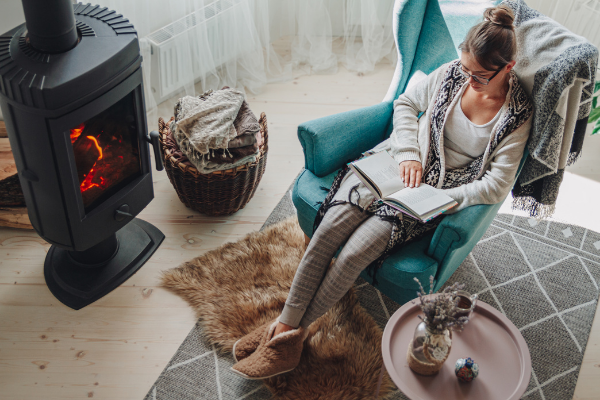How to enjoy a wonderful winter: Dossier special
It might be cold outside, but if we learn to rest and retreat, this season of dormancy and renewal can be a gift to cherish, discovers Anita Chaudhuri in this six-part dossier

Maybe it’s because I am Scottish, but I have always loved winter – glowering skies, a pot of something delicious bubbling on the stove, a sparkly walk at twilight… I realise, however, that there are many who don’t share my cosy-toed view, who dread winter’s arrival and see it as something to be endured, or escaped altogether.
At its most visceral, winter can trigger seasonal affective disorder (SAD), a condition linked to reduced exposure to sunlight that inhibits the production of mood-boosting hormones, including melatonin and serotonin. One in 30 adults in the UK will suffer significantly with SAD at some point in their life, according to the Royal College of Psychiatrists, but one in three of us experience some symptoms, and more than half of us report having lower mood in winter than in summer, a YouGov study reveals.
But even for those without a clinical condition, it can feel like an ambitious goal to flourish when it’s cold, wet and dark outside. How do we even begin to bring a sense of wonder into our lives during this time of year?
In her bestselling book, Wintering (Ebury, £9.99), Katherine May celebrates the magic of wintertime: ‘A surprising cluster of novels and fairy tales are set in the snow,’ May reflects. ‘Our knowledge of winter is a fragment of childhood, almost innate. The changes that take place in winter are a kind of alchemy, an enchantment performed by ordinary creatures to survive.’
This is true. Stories from The Snow Queen to Narnia informed my feelings about winter growing up. But how might we go about recapturing that in adulthood?
‘Once we stop wishing that it was summer, winter can be a glorious season in which the world takes on a sparse beauty and even the pavements sparkle,’ May says. ‘It’s a time for reflection and recuperation, for slow replenishment and for putting your house in order.’
Acceptance is key, she believes, which means giving yourself full permission to do those ‘deeply unfashionable’ things, such as slowing down, letting your spare time expand and resting.
‘You’re not going to avoid winter, so you might as well embrace it,’ she tells me from her home in Whitstable, Kent, which is no doubt atmospheric at this time of year. ‘I know people who hate it so much they try not to do anything for the whole season! We can invest so much energy in flinching away from things we find unpleasant or don’t want to happen, but acceptance and stepping towards them lessens the pain.’
 May starts psyching herself up for winter as early as August. ‘By then, I can already feel the change in the seasons. I start itching to get out my cardigans. I retrieve all my woollens and wash them, and then I get my clothes drawers ready. I take an inventory to see what I need to stock up on or repair,’ she explains.
May starts psyching herself up for winter as early as August. ‘By then, I can already feel the change in the seasons. I start itching to get out my cardigans. I retrieve all my woollens and wash them, and then I get my clothes drawers ready. I take an inventory to see what I need to stock up on or repair,’ she explains.
‘And I love making pickles. The man across the street from me has a plum tree and I noticed he never picks the fruit, so I asked if I could have them this year.’
For May, these small, homely acts are much needed to mentally prepare for what’s ahead. ‘It’s about stocking up on what will be scarce. There’s great comfort in having a well-packed cupboard that you can also share with others,’ she says.
‘I celebrate the winter solstice and pay close attention to where the sun goes down on the beach, and how the days are shortening. And, on New Year’s Day, I join others in a cold-water swim in the sea.’
Find your zen
One strategy that can help retain equanimity is learning how to adopt a calm mindset. ‘The benefits of doing so are that you can take a wider perspective and you can be intentional rather than reactive,’ says Gabrielle Treanor, a coach and founder of The Calm Mind Club.
‘So, instead of stomping around saying “I hate winter”, ask yourself how you can best use your time. What is going to help you get through this period?’
Treanor notes that, for some people, it’s tempting to fall into a frenzy of activity in order to distract yourself from what’s going on outside. This reminds me of a friend who launches into complicated DIY projects as soon as the clocks go back. Invariably, I feel stressed out just listening to the details. ‘Rather than getting caught up in doing, slow down.
There is this myth that rest is passive but you have to make an active decision to do it,’ says Treanor. ‘When you slow down and adopt a calm mindset, you can make wiser choices and listen to your intuition about what actions would serve you best. It also helps you tune into your mood and feelings. When you do this, sometimes you might notice for the first time that you are actually struggling and need help. Often, we don’t notice that simple truth because we force ourselves to press on with the to-do list.’
Treanor admits that she never liked winter, even as a child, but that she has trained herself to make the best of it. ‘As an introvert, I do like the permission to hibernate. I can say, “Oh, look, it’s horrible weather. Hooray! We’re allowed to stay home,”’ she says. ‘Slowing down is natural. Imagine if the natural world kept growing and producing? Rather, we need that period when everything dies back. Things are being restored, even if we can’t see it. Without winter, we don’t get the lovely green trees and flowers. We need to take root in the dark, the cold, the fallow.’

Another way to look at it, suggests Treanor, is to consider that by resting in winter, we will have more energy to do the things we want to do come spring. ‘We are not Duracell bunnies – we can’t be “on” all the time. So take things down a few notches, schedule downtime and go to bed earlier. Often, we see resting as lazy – reframe it as a time of germination and of new seeds taking root.’
Are you suffering from seasonal affective disorder?
If you have SAD, you may experience some of the symptoms below, says Mind, the mental health charity, but be aware that SAD is different for different people, and can vary from year to year. You may also have other feelings that aren’t listed here:
* Lack of energy
* Finding it hard to concentrate
* Not wanting to see people
* Sleep problems, such as sleeping more or less than usual, difficulty waking up or falling and staying asleep
* Feeling sad, low, tearful, guilty or hopeless about life
* Changes in your appetite – for example, feeling hungrier or wanting more snacks
* Being more prone to physical health problems, such as colds, infections and other illnesses
* Losing interest in sex or physical contact with loved ones
* Suicidal feelings
* Other symptoms of depression
If you have other mental health problems, you might find those symptoms get worse when you’re affected by SAD. Talk to your GP if you have any concerns about your health.
Keep intrinsic goals in mind
The key to making the most of winter is all about understanding motivation, believes Sharath Jeevan, author of Intrinsic: A Manifesto To Reignite Our Inner Drive (Octopus, £14.99). ‘Many countries have far worse winters than us, yet do well on happiness index ratings – Scandinavian countries and Canada, for example.’
Rather than focusing on external goals – money, fame and impressing our social media followers – Jeevan suggests we prioritise those inner goals that will increase our happiness, self-esteem and wellbeing. ‘Think about your life purpose, and the type of person you want to be in the world. Are you living a life that serves and helps others – at work, in relationships, with your friends, as a parent and in the community? How are you making a positive difference?’
What this boils down to in practice is being mindful of bringing your best self to any given situation, no matter the weather. It doesn’t have to be grandiose either. ‘Say you’re meeting a friend in a cafe… You might be feeling grumpy and thinking of cancelling because there’s a freezing-cold walk once you get off the train. But if you reframe your thinking to focus on showing up for your friend, really being present and listening to them when you get there, it will transform the experience for both of you.’
If the pandemic has taught us anything, it is how to connect with others virtually. This is another tool we can deploy to help and support others during the less social months of winter. ‘Make a commitment to yourself to be there for your friends and loved ones – a quick WhatsApp or family video call can make a difference to someone’s day,’ says Jeevan. ‘The other day, I received a surprise call from someone who lives abroad who I hadn’t heard from in ages. He said he had just read an article about my new book online and wanted to congratulate me. The conversation only lasted three minutes, but it made my week.’
Developing a sense of autonomy, instead of feeling that you are a victim of inclement weather, can also help, adds Jeevan. ‘Rather than dragging your family out for a walk and telling them they need to get fresh air on a cold day, why not plan a nice big Sunday roast in the pub together at the end, and perhaps invite others to join you? It’s a way of being more intentional and feeling in control of your life for the benefit of all.’
Embrace the light
Although winter days are shorter, it is worth making the effort to get outside into daylight whenever you can. Not only will this reset your body clock to the rhythm of winter, but the gentle light at this time of year can be incredibly beautiful.
Momtaz Begum-Hossain, author of Hello Rainbow: Finding Happiness In Colour (The Ivy Press, £14.99), has some unexpected advice. ‘I’m known for being a lover of bright hues, but in the winter one of my favourite things to do is to go for a walk along a beach. There will be grey as far as the eye can see – grey sky, grey sea, grey horizon. Yet, if you pay attention, there’s beauty in that.’
 Begum-Hossain believes that we can use colour to boost our mood, and should go on colour-hunting walks, even on the gloomiest of days. ‘If you start to pay attention, you will develop an appreciation of the tiniest details – an iridescent dewdrop on a blade of grass, icicles on a windowsill, a brightly coloured front door…’ But her favourite mood booster is to watch the sunrise and the sunset in winter – the only time of year when this is possible without getting up in the middle of the night.
Begum-Hossain believes that we can use colour to boost our mood, and should go on colour-hunting walks, even on the gloomiest of days. ‘If you start to pay attention, you will develop an appreciation of the tiniest details – an iridescent dewdrop on a blade of grass, icicles on a windowsill, a brightly coloured front door…’ But her favourite mood booster is to watch the sunrise and the sunset in winter – the only time of year when this is possible without getting up in the middle of the night.
‘Watching a winter sunrise is the best possible way to start your day. If you can watch a sunset on the same day, so much the better. Even if you’re working in an office, you can set your alarm to get up and look out of the window for five minutes. The colours in winter are so vivid, particularly on a cloudy day when you can see the sky turning pink, purple, orange and yellow. It’s wonderful.’
By embracing a more positive and creative approach to winter, you may even find yourself yearning for those woolly jumpers and roaring fires when the birds are singing and the trees are blooming once again.
Turn seasonal SADness around
Accept what’s coming
No one can stop winter, or the fact that it is going to be darker, colder and wetter, so complaining isn’t going to help. Ruminating on what you can’t control keeps you stuck in misery. Instead, recognise what it is about the situation that you dislike, for example: ‘It makes me feel gloomy and fed up, and all the feelings I don’t want to feel.
Make a plan
What can you do about it? You can decide how to respond. For example, you might say, ‘OK, today I am going to focus on making a delicious and different soup for dinner.’ The TV schedules are usually brilliant at this time of year, so plan your viewing so you have something to look forward to in the evenings.
Focus on past successes
If you have struggled with this time of year before, the thought of winter can be scary. Make a list of everything that helped you get through it – for example, getting professional support, scheduling treats or buying a light box. Post the list somewhere prominent and schedule time for helpful activities.
Change your environment
Getting up on a dark morning can be grim. Create an environment that feels cosy and uplifting, such as stringing fairy lights around the kitchen or listening to a playlist of upbeat music while you eat your breakfast.
Be patient
In this era of life hacks, our brains rush ahead, thinking we should be able to find a quick fix for the winter blues. Accept that it will take time to adjust to the new, and beneficial, season, and that it is normal to feel a little glum until you settle into it.
Brighten your days
1. Colour meditation
On a dark winter day, you can use colour breathing to boost your mood and harness the energy of a particular hue. In colour psychology, different colours have a different impact on your mood. For example, I like to work with yellow, which is incredibly positive. When you get up in the morning, try a simple breathing exercise where you visualise the colour as you inhale and, as you exhale, imagine sending it out into the world.
Focus on the colour and imagine it filling your entire body.
Other great colours to use are orange to enhance creativity and green to restore balance and calm. You can wear the colour to keep you connected to it throughout the day, or use an object in that shade, such as a mug or plate.

2. Colour mood tracker
This exercise is best done first thing in the morning. You will need a 30cm canvas or sheet of paper and a box of paints or crayons in as many colours as possible. The idea is that, every day, you pick the colour that best represents your mood and paint or draw a line with it. After a month, you should have a fairly good idea of how you are coping with winter and your dominant themes. Five days of red in a row, for example, might indicate anger – although it could also signify passion. Everyone’s relationship with colour is different, so it can help to mark on the back of the page a keyword for each colour line when you start out.
3. Colour survival kit
Assemble a colour ‘first-aid kit’ for when days feel overwhelming and dark. You can fill it with anything that you know will boost your mood. In mine, I keep a bottle of nail varnish, a packet of Rainbow Drops sweets, emergency chocolates, some colourful pens and colouring-in sheets, a rainbow bracelet, a pot of glitter and a precious photograph. You could also try dried flower petals, confetti and make-up.
Photographs: Getty Images
Words: Anita Chaudhuri








